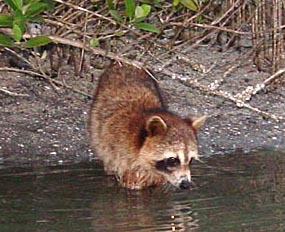 The Big Chill Takes The Bite Out Of Nonnative Wildlife
The Big Chill Takes The Bite Out Of Nonnative Wildlife
South Florida’s recent unusual cold weather might be helping with the problem of nonnative species.
Pythons and other snakes, reptiles and fish are dying by the thousands as temperatures drop.
Colder Weather Puts Things Into Balance
Vultures circled over the Anhinga Trail inside the Everglades National Park where thousands of dead nonnative fish floated in the marshes.
Among the Burmese pythons found in the park lately about have of them are dead.
Dead iguanas have dropped from trees and into lawns and patios across South Florida.
Southern Tip Of Florida No Exception
In Western Miami-Dade County, three African rock pythons were found dead.
Although South Florida’s warm, moist climate has nurtured a vast range of non-native plants and animals, a January cold snap reminded these intruders that they’re not in Burma or Ecuador anymore.
Temperatures in the 30s have apparently killed Burmese pythons, iguanas and other unwanted species.
“Anecdotally, we might have lost maybe half of the pythons out there to the cold,” said Scott Hardin, the Florida Fish and Wildlife Conservation Commission’s exotic species coordinator. “Iguanas definitely. From a collection of observations from people, more than 50% fatality on green iguanas. . . . Lots of freshwater fish died; no way to estimate that.”
Nonnative fish that have infested the Everglades are turning up dead in the thousands, including the Mayan Cichlid, walking catfish and Spotfin Spiny Eel, said David Hallac, chief biologist at Everglades National Park.
Experts Agree Cold Weather Stuns Exotic Wildlife Living In Florida
No one knows how many Burmese pythons live in the Everglades, where some were released as unwanted pets and others found refuge after hurricanes destroyed their breeding sites. But there are a lot fewer today than there were a month ago.
Greg Graziani, a police officer who owns a reptile breeding facility, is one of several licensed python hunters who stalk snakes in the Everglades. In four days, he found two dead snakes, two live ones and one on the verge of death.
“Vultures had pecked through 12 inches by 4 inches down the back of this animal’s body,” he said. “I thought it was dead, and we reached down to pick it up, and it was very much alive.”
In cold weather, Graziani said, pythons go into a catatonic state, and if they don’t make it to a safe place to ride out the weather, they freeze to death.
“We’re finding the smaller pythons are handling it better than the large ones,” Graziani said. “The smaller ones can get into different cracks and crevices to maintain the temperatures they need.”
Some information from the LA Times
If you discover any kind of exotic wildlife living in the bushes or canals around your property anywhere in Central Florida. Do not hesitate to give Nuisance Wildlife Trapper a call immediately. The number is:
866-263-WILD (9453)
 is easy pickings.
is easy pickings.

 The Big Chill Takes The Bite Out Of Nonnative Wildlife
The Big Chill Takes The Bite Out Of Nonnative Wildlife





 Always Seek A Qualified Person For The Job
Always Seek A Qualified Person For The Job residents to exterminate feral colonies found on properties close to people.
residents to exterminate feral colonies found on properties close to people.













